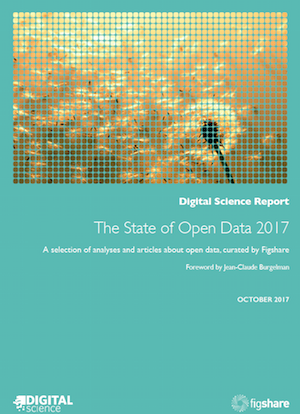What open data means for an institution
Amidst a growing number of mandates for data sharing and reuse, South African universities are scrambling to provide services to the research community to facilitate compliance with the complex data management requirements of numerous international funding agencies. The impending burden posed on institutions to fund this requirement is now brought sharply into focus with the introduction of a similar mandate by the National Research Fund (NRF), the very lifeblood on which the national academic enterprise is reliant.

At a time when nationwide student protest action has highlighted the financial constraints on the higher education sector, the need to act collaboratively is imperative to sustain levels of excellence. The award of a substantial grant to the University of Cape Town (UCT) as the lead institution on a regional consortium to establish and host a regional data node in the National Integrated Cyberinfrastructure System (NICIS) signals a new way of thinking about collaborative systems and services, based on open data principles, that marks a clear divergence from institutional infrastructure development in the past.
Institutional responses to Open Data
An extensive evaluation process of data repository platforms was conducted by UCT eResearch, aimed at provisioning an effective research data service based on emerging standards and best practice. In comparing open source and licensed options, and taking into consideration the cost of infrastructure support staff, Figshare was identified as the most appropriate solution. The concurrent development of an institutional research data management policy together with an extensive advocacy programme gave substance to the evaluation, in the valuable feedback from the research community. The point was made that acceptance of the open data principle is less about funder compliance, and more about individual agency.
This is a valiant manifestation of academic freedom at UCT, a research-intensive university where scholarly communication- and more specifically data publication – has become the currency of the research enterprise, supported in a national subsidy system based on publication counts.
The research community acknowledge the societal benefits of open data, in driving greater scientific integrity, enabling a strategic response to societal challenges. They see the value of collaborative research and wider dissemination of their outcomes – but they insist on the right to make the decision whether to share openly.
It is not surprising therefore, that the functionality provided by Figshare to separate data upload from data publication has found wide appeal. It is also not surprising that UCT has developed specific terms of deposit that recognize the responsibility of the researcher to determine the necessary limits on openness particularly relating to personal information and commercial considerations.
Conclusions
The outcomes of the advocacy programme conducted at UCT suggest that while the research community fully support global infrastructure developments, many questions remain regarding data sharing and reuse. Primarily, the demand is for greater support for both staff and students to better understand and use open data to strengthen research practice as a whole.
by Dr Dale Peters, UCT eResearch Director.
This article was published in the annual report from Figshare:
The State of Open Data 2017, which looks at global attitudes
towards open data.

